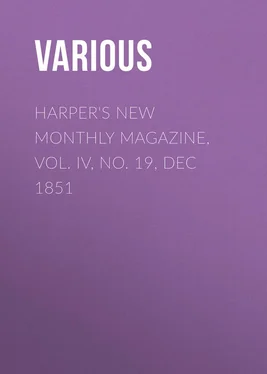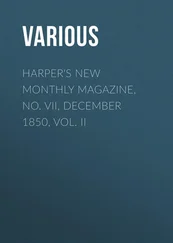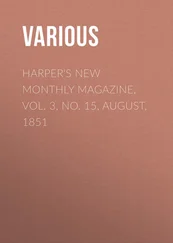Various - Harper's New Monthly Magazine, Vol. IV, No. 19, Dec 1851
Здесь есть возможность читать онлайн «Various - Harper's New Monthly Magazine, Vol. IV, No. 19, Dec 1851» — ознакомительный отрывок электронной книги совершенно бесплатно, а после прочтения отрывка купить полную версию. В некоторых случаях можно слушать аудио, скачать через торрент в формате fb2 и присутствует краткое содержание. Издательство: Иностранный паблик, Жанр: periodic, foreign_edu, на английском языке. Описание произведения, (предисловие) а так же отзывы посетителей доступны на портале библиотеки ЛибКат.
- Название:Harper's New Monthly Magazine, Vol. IV, No. 19, Dec 1851
- Автор:
- Издательство:Иностранный паблик
- Жанр:
- Год:неизвестен
- ISBN:нет данных
- Рейтинг книги:5 / 5. Голосов: 1
-
Избранное:Добавить в избранное
- Отзывы:
-
Ваша оценка:
- 100
- 1
- 2
- 3
- 4
- 5
Harper's New Monthly Magazine, Vol. IV, No. 19, Dec 1851: краткое содержание, описание и аннотация
Предлагаем к чтению аннотацию, описание, краткое содержание или предисловие (зависит от того, что написал сам автор книги «Harper's New Monthly Magazine, Vol. IV, No. 19, Dec 1851»). Если вы не нашли необходимую информацию о книге — напишите в комментариях, мы постараемся отыскать её.
Harper's New Monthly Magazine, Vol. IV, No. 19, Dec 1851 — читать онлайн ознакомительный отрывок
Ниже представлен текст книги, разбитый по страницам. Система сохранения места последней прочитанной страницы, позволяет с удобством читать онлайн бесплатно книгу «Harper's New Monthly Magazine, Vol. IV, No. 19, Dec 1851», без необходимости каждый раз заново искать на чём Вы остановились. Поставьте закладку, и сможете в любой момент перейти на страницу, на которой закончили чтение.
Интервал:
Закладка:
The neulahs, like other of the weasel kind – and like some animals I know of a loftier species – are very rapacious, slaying without reference to their wants; and Jumnie, although fond of milk, used to delight in livers and brains of fowls, which she relished even after they were dressed for our table.
The natives of India never molest the neulah. They like to see it about their dwellings, on account of its snake and rat-killing propensities; and on a similar account it must have been that this creature was deified by the Egyptians, whose country abounded with reptiles, and would have been absolutely alive with crocodiles but for the havoc it made among the numerous eggs, which it delighted to suck. For this reason the ichneumons were embalmed as public benefactors, and their bodies are still found lying in state in some of the pyramids. Among the Hindoos, however, the neulah does not obtain quite such high honors, although the elephant, monkey, lion, snake, rat, goose, &c., play a prominent part in the religious myths, and are styled the Bâhons, or vehicles of the gods.
In Hindoostan the ichneumon is not supposed to kill the crocodile, though it is in the mouth of every old woman that it possesses the knowledge of a remedy against the bite of a poisonous snake, which its instinct leads it to dig out of the ground; but this on dit has never been ascertained to be true, and my belief is that it is only based on the great agility and dexterity of the neulah. Eye-witnesses say that his battles with man's greatest enemy end generally in the death of the snake, which the neulah seizes by the back of the neck, and after frequent onsets at last kills and eats, rejecting nothing but the head.
The color of the Indian neulah is a grayish-brown; but its chief beauty lies in its splendid squirrel-like tail, and lively, prominent, dark-brown eyes. Like most of the weasel kind, however, it has rather a disagreeable odor; and if it were not for this there would not be a sweeter pet in existence.
So far the experience of an Old Indian; and we now turn to another authority on the highly-curious subject just glanced at – the knowledge of the ichneumon of a specific against the poison of the snake. Calder Campbell, in his recent series of tales, "Winter Nights" – and capital amusement for such nights they are – describes in almost a painfully truthful manner the adventure of an officer in India, who was an eye-witness, under very extraordinary circumstances, to the feat of the ichneumon. The officer, through some accident, was wandering on foot, and at night, through a desolate part of the country, and at length, overcome with fatigue, threw himself down on the dry, crisp spear-grass, and just as the faint edge of the dawn appeared, fell asleep.
"No doubt of it! I slept soundly, sweetly – no doubt of it! I have never since then slept in the open air either soundly or sweetly, for my awaking was full of horror! Before I was fully awake, however, I had a strange perception of danger, which tied me down to the earth, warning me against all motion. I knew that there was a shadow creeping over me, beneath which to lie in dumb inaction was the wisest resource. I felt that my lower extremities were being invaded by the heavy coils of a living chain; but as if a providential opiate had been infused into my system, preventing all movement of thew or sinew, I knew not till I was wide awake that an enormous serpent covered the whole of my nether limbs, up to the knees!
"'My God! I am lost!' was the mental exclamation I made, as every drop of blood in my veins seemed turned to ice; and anon I shook like an aspen leaf, until the very fear that my sudden palsy might rouse the reptile, occasioned a revulsion of feeling, and I again lay paralyzed.
"It slept, or at all events remained stirless; and how long it so remained I know not, for time to the fear-struck is as the ring of eternity. All at once the sky cleared up – the moon shone out – the stars glanced over me; I could see them all, as I lay stretched on my side, one hand under my head, whence I dared not remove it; neither dared I looked downward at the loathsome bed-fellow which my evil stars had sent me.
"Unexpectedly, a new object of terror supervened: a curious purring sound behind me, followed by two smart taps on the ground, put the snake on the alert, for it moved, and I felt that it was crawling upward to my breast. At that moment, when I was almost maddened by insupportable apprehension into starting up to meet, perhaps, certain destruction, something sprang upon my shoulder – upon the reptile! There was a shrill cry from the new assailant, a loud, appalling hiss from the serpent. For an instant I could feel them wrestling, as it were, on my body; in the next, they were beside me on the turf; in another, a few paces off, struggling, twisting round each other, fighting furiously, I beheld them – a mungoos or ichneumon and a cobra di capello !
"I started up; I watched that most singular combat, for all was now clear as day. I saw them stand aloof for a moment – the deep, venomous fascination of the snaky glance powerless against the keen, quick, restless orbs of its opponent: I saw this duel of the eye exchange once more for closer conflict: I saw that the mungoos was bitten; that it darted away, doubtless in search of that still unknown plant whose juices are its alleged antidote against snake-bite; that it returned with fresh vigor to the attack; and then, glad sight! I saw the cobra di capello, maimed from hooded head to scaly tail, fall lifeless from its hitherto demi-erect position with a baffled hiss; while the wonderful victor, indulging itself in a series of leaps upon the body of its antagonist, danced and bounded about, purring and spitting like an enraged cat!
"Little graceful creature! I have ever since kept a pet mungoos – the most attached, the most playful, and the most frog-devouring of all animals."
Many other authors refer to the alleged antidote against a snake-bite, known only to the ichneumon, and there are about as many different opinions as there are authors; but, on the whole, our Old Indian appears to us to be on the strongest side.
KOSSUTH – A BIOGRAPHICAL SKETCH
Louis Kossuth 8 8 Pronounced as though written Kos-shoot , with the accent on the last syllable. The Magyar equivalent for the French Louis and the German Ludwig is Lajos. We have given the date of his birth, which seems best authenticated. The notice of the Austrian police, quoted below, makes him to have been born in 1804; still another account gives 1801 as the year of his birth. The portrait which we furnish is from a picture taken a little more than two years since in Hungary, for Messrs. Goupil, the well-known picture-dealers of Paris and New York, and is undoubtedly an authentic likeness of him at that time. The following is a pen-and-ink portrait of Kossuth, drawn by those capital artists, the Police authorities of Vienna: – " Louis Kossuth , an ex-advocate, journalist, Minister of Finance, President of the Committee of Defense, Governor of the Hungarian Republic, born in Hungary, Catholic [this is an error, Kossuth is of the Lutheran faith], married. He is of middle height, strong, thin; the face oval, complexion pale, the forehead high and open, hair chestnut, eyes blue, eyebrows dark and very thick, mouth very small and well-formed, teeth fine, chin round. He wears a mustache and imperial, and his curled hair does not entirely cover the upper part of the head. He has a white and delicate hand, the fingers long. He speaks German, Hungarian, Latin, Slovack, a little French and Italian. His bearing when calm, is solemn, full of a certain dignity; his movements elegant, his voice agreeable, softly penetrating, and very distinct, even when he speaks low. He produces, in general, the effect of an enthusiast; his looks often fixed on the heavens; and the expression of his eyes, which are fine, contributes to give him the air of a dreamer. His exterior does not announce the energy of his character." Photography could hardly produce a picture more minutely accurate.
was born at Monok, in Zemplin, one of the northern counties of Hungary, on the 27th of April, 1806. His family was ancient, but impoverished; his father served in the Austrian army during the wars against Napoleon; his mother, who still survives to exult in the glory of her son, is represented to be a woman of extraordinary force of mind and character. Kossuth thus adds another to the long list of great men who seem to have inherited their genius from their mothers. As a boy he was remarkable for the winning gentleness of his disposition, and for an earnest enthusiasm, which gave promise of future eminence, could he but break the bonds imposed by low birth and iron fortune. A young clergyman was attracted by the character of the boy, and voluntarily took upon himself the office of his tutor, and thus first opened before his mind visions of a broader world than that of the miserable village of his residence. But these serene days of powers expanding under genial guidance soon passed away. His father died, his tutor was translated to another post, and the walls of his prison-house seemed again to close upon the boy. But by the aid of members of his family, themselves in humble circumstances, he was enabled to attend such schools as the district furnished. Little worth knowing was taught there; but among that little was the Latin language; and through that door the young dreamer was introduced into the broad domains of history, where, abandoning the mean present, he could range at will through the immortal past. History relates nothing so spirit-stirring as the struggles of some bold patriot to overthrow or resist arbitrary power. Hence the young student of history is always a republican; but, unlike many others, Kossuth never changed from that faith.
Интервал:
Закладка:
Похожие книги на «Harper's New Monthly Magazine, Vol. IV, No. 19, Dec 1851»
Представляем Вашему вниманию похожие книги на «Harper's New Monthly Magazine, Vol. IV, No. 19, Dec 1851» списком для выбора. Мы отобрали схожую по названию и смыслу литературу в надежде предоставить читателям больше вариантов отыскать новые, интересные, ещё непрочитанные произведения.
Обсуждение, отзывы о книге «Harper's New Monthly Magazine, Vol. IV, No. 19, Dec 1851» и просто собственные мнения читателей. Оставьте ваши комментарии, напишите, что Вы думаете о произведении, его смысле или главных героях. Укажите что конкретно понравилось, а что нет, и почему Вы так считаете.












